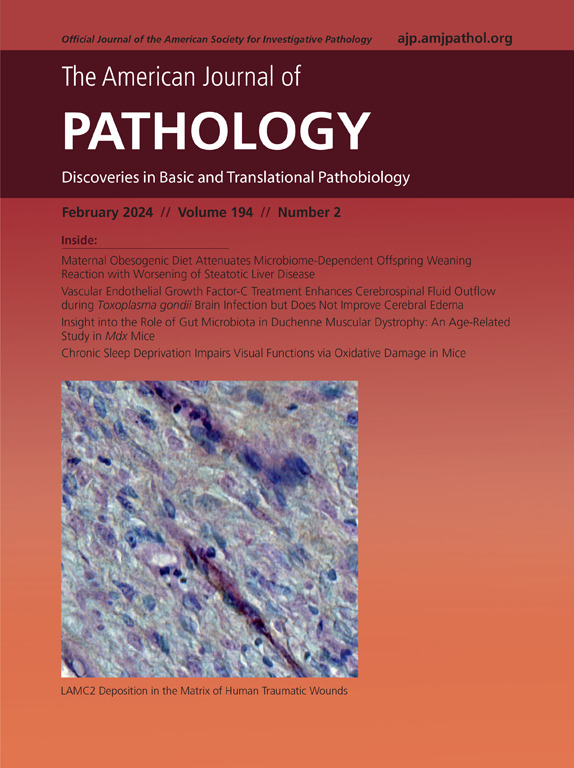Tumor-Derived Immunoglobulin-Like Transcript 4 Promotes Postoperative Relapse via Inducing Vasculogenic Mimicry through MAPK/ERK Signaling in Hepatocellular Carcinoma
IF 4.7
2区 医学
Q1 PATHOLOGY
引用次数: 0
Abstract
The efficacy of conventional anti-angiogenesis drugs is usually low in treating hepatocellular carcinoma (HCC). Therefore, there is an urgent need to find new precise therapeutic targets and to develop more effective drugs for the treatment of HCC. Vasculogenic mimicry (VM) is different from classic endothelium-dependent angiogenesis and is associated with a poor prognosis in patients with malignant tumor. However, the mechanism underlying VM is complex and not fully defined. Ig-like transcript (ILT)-4, as a negative regulator of immune response, is expressed in many solid tumors. However, whether and how ILT4 regulates VM remains unclear. This study found VM enriched in HCC tissues, especially in tissues from patients with relapse within 5 years after surgery. Similarly, ILT4 expression level was also higher in HCC tissues from patients with relapse within 5 years after surgery. Linear regression analysis revealed a positive correlation between the expression of ILT4 and VM density. Furthermore, overexpression/knockdown of ILT4 expression upregulated/down-regulated VM-related marker, three-dimensional tube formation, and migration and invasion in HCC cell lines in vitro. In mechanistic studies, ILT4 promoted VM formation via mitogen-activated protein kinase (MAPK)/ERK signaling. This study provides a rationale and mechanism for ILT4-mediated postoperative relapse via inducing VM in HCC. The related molecular pathways can be used as novel therapeutic targets for the inhibition of HCC angiogenesis and postoperative relapse.
肿瘤源性免疫球蛋白样转录物4通过MAPK/ERK信号转导诱导肝细胞癌的血管生成模拟,从而促进术后复发。
传统的抗血管生成药物在肝细胞癌(HCC)治疗中的效果通常并不理想。因此,寻找新的精确治疗靶点并进一步开发更有效的药物来治疗 HCC 迫在眉睫。血管生成模拟(VM)不同于传统的内皮依赖性血管生成,与恶性肿瘤患者的不良预后有关。然而,VM发生的机制十分复杂,尚未完全明确。免疫球蛋白样转录物(ILT)4 是免疫反应的负调控因子,最近发现它在许多实体瘤中都有表达。然而,ILT4 是否以及如何调控 VM 仍不清楚。在本研究中,我们发现 VM 在 HCC 组织中富集,尤其是在术后 5 年内复发的患者组织中。同样,术后 5 年内复发患者的 HCC 组织中 ILT4 的表达水平也较高。线性回归分析表明,ILT4 的表达与 VM 密度呈正相关。此外,ILT4的过表达/敲除会上调/下调VM相关标记物、三维管形成、HCC细胞株在体外的迁移和侵袭。机理研究表明,ILT4 通过 MAPK/ERK 信号转导促进了 VM 的形成。总之,本研究为 ILT4 通过诱导 HCC VM 而介导术后复发提供了理论依据和机制。相关分子通路可作为抑制 HCC 血管生成和术后复发的新型治疗靶点。
本文章由计算机程序翻译,如有差异,请以英文原文为准。
求助全文
约1分钟内获得全文
求助全文
来源期刊
CiteScore
11.40
自引率
0.00%
发文量
178
审稿时长
30 days
期刊介绍:
The American Journal of Pathology, official journal of the American Society for Investigative Pathology, published by Elsevier, Inc., seeks high-quality original research reports, reviews, and commentaries related to the molecular and cellular basis of disease. The editors will consider basic, translational, and clinical investigations that directly address mechanisms of pathogenesis or provide a foundation for future mechanistic inquiries. Examples of such foundational investigations include data mining, identification of biomarkers, molecular pathology, and discovery research. Foundational studies that incorporate deep learning and artificial intelligence are also welcome. High priority is given to studies of human disease and relevant experimental models using molecular, cellular, and organismal approaches.

 求助内容:
求助内容: 应助结果提醒方式:
应助结果提醒方式:


